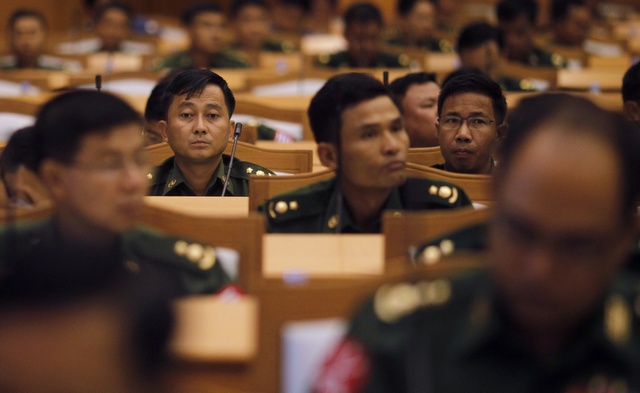“Will Burma become a democratic country in ten years?”—this is the pertinent question that needs to be deeply discussed as the world is observing the country’s on-going reform process with great enthusiasm and excitement.
Since the November 2010 election that gave birth to the country’s first civilian government in decades, Burma seems to be moving towards democracy. After years of authoritarian rule, the military suddenly stepped away from the spotlight of power despite the lack of imminent threats.
The Burmese military leaders had long lived in isolation and survived. They had direct access to vast financial resources. In the meantime, international sanctions failed to put pressure on them. This was partly because their regime was legitimised by Burma’s close neighbours, including China and the Association of Southeast Asian Nations (ASEAN). So when the military decided to withdraw from politics, many people were left confused and even suspicious of its real agenda.
Amid this confusion and suspicion, signs of democracy have emerged. Hundreds of political prisoners have been set free. Burma’s media is able to operate more freely, although it is still working under difficult constraints. Trade unions have been permitted to exist. Human rights organisations have sprung up all over the country. The vibrancy of civil society organisations inside the country is evident.
In November 2010, the military leaders released Burma’s most prominent opposition leader, Aung San Suu Kyi, from house arrest after 15 years. Suu Kyi has since re-entered the political scene. She is now helping the new civilian regime of President Thein Sein campaign for the lifting of sanctions. In many ways, she has become the de facto spokeswoman of the Thein Sein regime.
With all these positive developments, the Burmese people have come to believe that their lives might be about to change for the better.
But some observers are less confident and not convinced that Burma will transition into a democratic state in a decade. Recently, a team at the Australian National University came up with a list of remaining hurdles to democratisation in Burma. Among them, communal conflict and constraints on the burgeoning print news media cast doubt on certain short-term prospects.
[pullquote] “Cronies could be allowed to further entrench their business empires” [/pullquote]
The goal of national reconciliation has been frustrated by the impunity that the army has long enjoyed. And although Suu Kyi’s party, the National League for Democracy (NLD), swept by-elections in 2012, it continues to be dominated by a single personality and has not yet built a platform upon which to represent itself as a viable alternative to the military-established Union Solidarity and Development Party (USDP) that currently holds an overwhelming number of seats in the national legislature.
But of all the problems that face the new government in Naypyidaw, one certainly stands out – resurgent civil war. The government has been engaging in conflict with some of its ethnic minorities for decades. Most recently, numerous armed clashes have occurred between the Burmese military and the Kachin Independent Army (KIA). Moreover, peace between Burma’s central government and the United Wa State Army (UWSA) has not yet been totally accomplished. Leading experts in Burma believe stability will come to the country only if it can settle the disputes with its minorities.
Then, there is the problem with the lack of “legal infrastructure”, the troublesome issue of citizenship (surely the Muslim Rohinyas are not accepted as a part of “Burmeseness”) and the amendment of the constitution, which still guarantees the military’s overwhelming political domination.
It is true that foreign direct investment is returning to country. But how the inflow of foreign capital will help improve the living standard of the Burmese remains an unsolved conundrum. Key businesses are still monopolised by cronies of the old regime. Now that western sanctions have been gradually abolished, these cronies could be allowed to further entrench their business empires. And this time, it will be legitimate.
It is extremely dangerous that the current optimistic mood in Burma and within the international community is obscuring the fact that these existing hurdles have the potential to seriously obstruct the on-going democratisation process. The absence of available democratisation theories, which could be applied to Burma’s current political climate, also plays a part in the misperception of the situation.
Essential factors that contribute to sustainable democratic reforms, such as strong opposition groups, an expanding middle class or the development of free media, are missing in Burma. Thus, the present developments within the realm of Burmese politics looks more like a rearrangement or a redistribution of power among top elites, including Daw Suu Kyi, without any real participation of the middle class.
Lastly, we must discuss and anticipate the role of the military in this new political climate. How will the military forge a working relationship with the government? The military has remained a key institution in Burma. To examine Burma’s political landscape without taking the role of the military into account would be a mistake. Today, there is still a misperception about the Burmese military. It is untrue that the military has lost its appetite for politics, especially when it still occupies 25 percent of the parliament’s seats. Many military hardliners are members of parliament and they will make sure that their interest will be protected.
Any move toward democracy, such as the strengthening of the rule of law and eradicating the culture of impunity, will only create friction in Burmese politics, particularly between the army and the civilian government. It is highly likely that the military will not compromise when it comes to the issue of transitional justice.And if it is pushed to the corner, the army will possibly do what it did best in the past—seize power from the civilian government.
-Pavin Chachavalpongpun is Associate Professor at Kyoto University’s Centre for Southeast Asian Studies.
-The opinions and views expressed in this piece are the author’s own and do not necessarily reflect DVB’s editorial policy.



